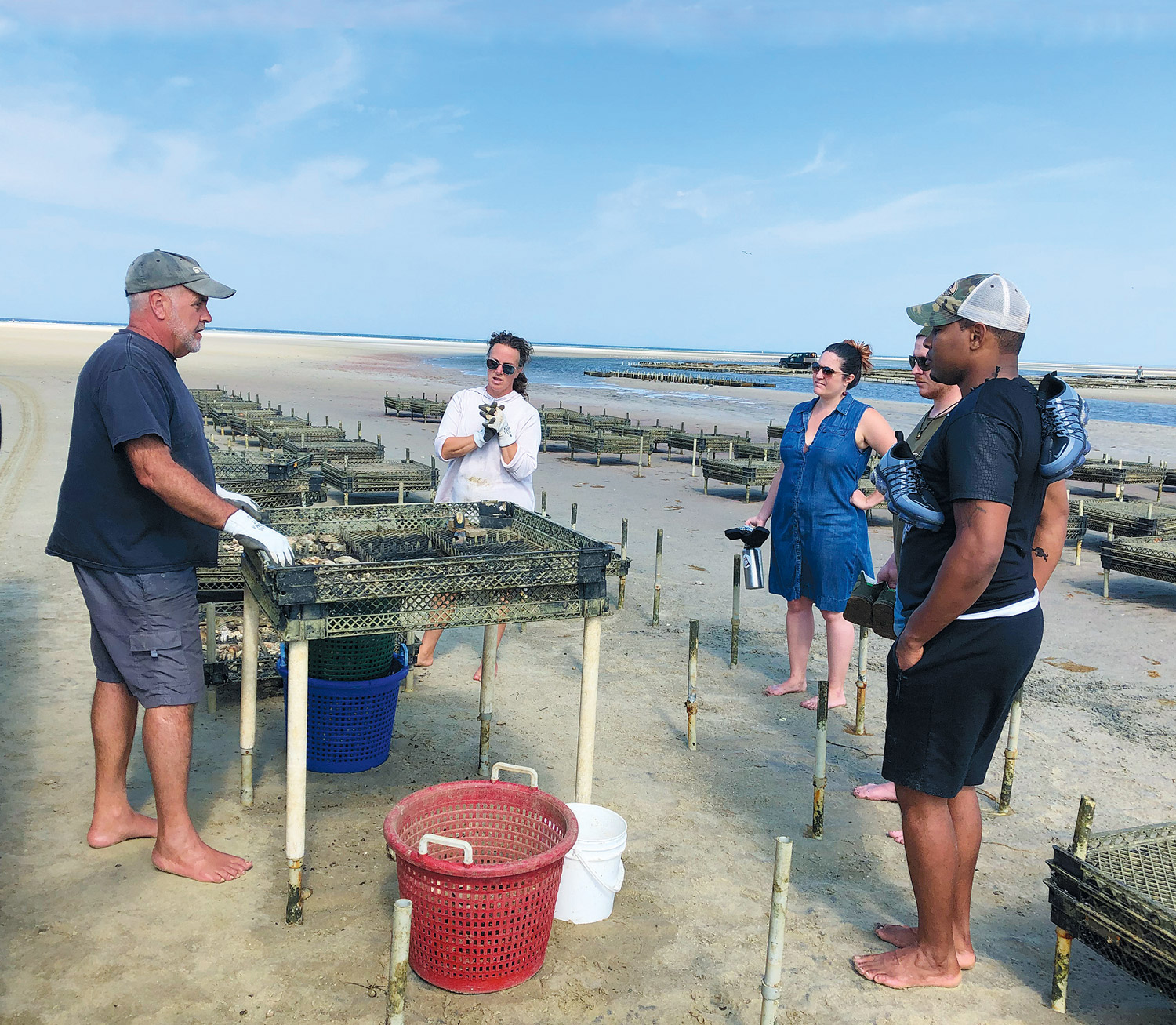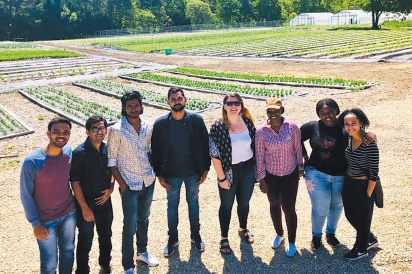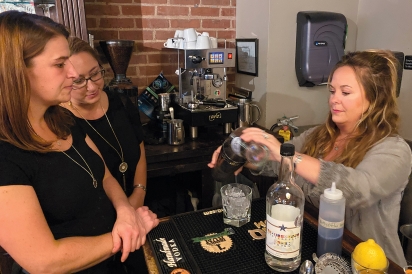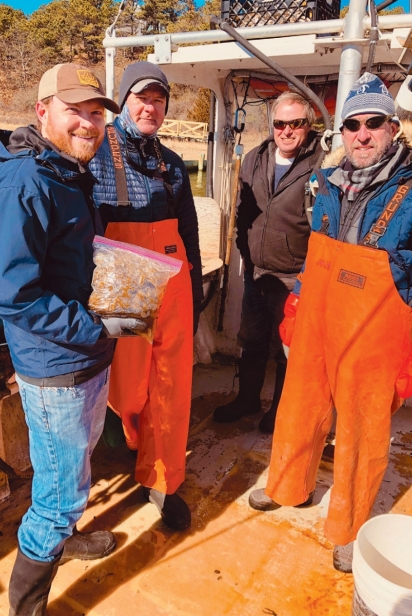Learning Never Tasted Better
Teachers aren’t the only ones who help foster a love of learning. When kids are bundled up and heading out the door before the sun has risen and there’s a hint of snow in the air, look at what’s happening in restaurants up and down the Cape. Many restaurant owners and chefs not only talk the talk, but walk the walk. Just ask Anthony Cole, executive chef of Chatham Bars Inn; Adam and Erica Dunn, owners of The Pheasant; and Florence Lowell, owner and executive chef of the Naked Oyster. Learning is on their menus daily.
Chatham Bars Inn, located in Chatham, has been a world-renowned coastal getaway and local favorite since its inception over a century ago. What started out as a hunting lodge has grown to include four distinct restaurants where staff are thoughtfully trained about the foods they serve. The restaurants’ innovative menus are transitioned slowly based on the seasons. The vegetables that are growing at the Chatham Bars Inn (CBI) Farm in Brewster, as well as what’s happening in fisheries and local dairy and cattle farms, all influence its culinary creativity. The Sacred Cod pays homage to traditional New England cuisine, but with flair. “The Yankee pot roast is really beef short rib smothered in a big, bold, unctuous wine sauce using Northeast Family Farms beef and beautiful carrots from the farm,” says Cole. During pre-shift lineups, there might be tastings with the staff where they learn about where foods are sourced and how they are prepared.
The Local Catch, served at a few of the restaurants including the Beach House, is made with fresh, locally caught fish and vegetables from the farm. “Because that changes every day, we’re always talking about that with staff, highlighting other dishes and reviewing them,” says Cole.
Due to potential food allergies, service staff and cooks are given hard copies of in-depth plating guides as part of their training. “It helps them to learn and memorize the dishes and is also a great reference to look back on in case they have to answer any questions,” says Cole. “It’s a spreadsheet that has a digital photograph of the dish, as well as a list of its components, including weights, garnishes, how its plated and any allergies associated with it.” It’s an efficient way to ensure nothing slips through the cracks and it is put together by Cole or the chefs in each of the restaurants.
Staff education occurs off the premises, too. Periodically, some of the chefs, cooks and waiters tour the grounds of the CBI Farm. They go inside the greenhouses and see how hydroponic tomatoes are grown, or walk through the fields to see how hardy the Toscano kale is even when temperatures dip.
Farming is not a science and it directly informs what’s on the menu. “We’ll do a lot of preservation when we have an abundance of crops: fermentation, pickling, canning. This enables us to always have something from the farm on our menu year round,” says Cole. They make their own kimchi, lacto-fermented hot sauce, sauerkraut and pickled vegetables. “Last year we fermented carrots and then made beautiful chickpea carrot fritters that were amazing,” says Cole. Because the staff has had the opportunity to interact with the produce, they can better speak to its characteristics.
Occasionally Cole and his chefs will go out on an oyster farm, or hop aboard a fishing boat with some weir fishermen in Nantucket Sound. This spring they visited the Chatham Kelp farm and saw long, amber strands of sugar kelp that co-founder Jamie Bassett and crew are growing in the ocean. “It’s a little more exclusive, but if people are interested, I’d try and set them up, and educate them,” says Cole. This past August during the Outstanding in the Field event, 400 people ate tuna crudo and sugar kelp. It was a hit.
Cole understands the importance of building strong relationships with the service staff and holding them accountable. “If you’re showing enthusiasm and passion then the staff will be more receptive to things,” says Cole. After premeal sessions where new dishes are explained, staff may be given a five- or ten-question quiz. “My chefs are teaching food safety,” says Cole. “We have people of different nationalities who speak different languages, or English is their second language. It’s really important to test comprehension and to clarify a little bit more if a server didn’t quite understand terminologies.”
Adam and Erica Dunn, of The Pheasant in Dennis, share Cole’s sentiment. They strive to give their staff the tools they need to not only understand the unique characteristics of the dishes they are serving, but to walk away with knowledge that will stay with them for life.
To ensure their staff understand what they are serving patrons, they go on mini staycations on the Cape, visiting places tourists flock to during the high season. Truro was top on their list because many of their purveyors are located here. The Highland Light may beckon tourists, but many inland businesses caught the eye of these forward thinking restaurateurs.
Truro Vineyards was first on their list. “Shane Mason, our manager, spent a year growing grapes in Napa so it was very important to him that the staff get to see the grapes actually growing on the vines, to walk around the vineyard, and to talk about varietal characteristics,” says Adam. “Wine education is a big component of our staff training,” says Erica. They also visited the new onsite distillery and learned how gin and rum are produced in massive copper pot stills. When they visited the Atlantic Spice Company, “the staff went a little wild buying stuff for the kitchen,” said Adam.
Next up was Chequessett Chocolate, where they import cacao pods and convert them into chocolate products. “We got to watch the whole process and talk with the owner about how its converted, tempered and blended. We were watching them grind cacao nibs into chocolate. It was unbelievable and eye opening for staff to see that,” says Adam.
They also visited Hillside Farms where they buy their free range chickens. Drew Locke, a seventh-generation chicken farmer, not only works full time in the school district, but raises all these birds. He sells them to farmers’ markets and to other accounts on the Cape. “He appreciates the support from businesses like us and we want to support him. The takeaway for our staff is to see the amount of labor that goes into raising chickens and slaughtering them, and this is just his side job,” says Adam. “It drives home how hard these guys work to bring food to us and how important it is, how special it is, that we get to serve it.” It sets the tone for the entire season.
The Pheasant also uses grass-fed beef from Seawind Meadows in Dennis, which is owned and operated by one of their employee’s parents who are ranchers and raise Highland cattle. “It’s really fun when you are sitting at a table and Annalee is your server and she’s talking about our Bolognese sauce that’s made with our house made pasta and beef from her family’s farm,” says Erica.
Their manager, Shane Mason, spearheaded a wine education component, too. Once a week, wine reps come in and run a tasting group, where they bring several bottles of wine and blind taste everybody. “There would be sheets to fill out, and staff would have to try and identify various characteristics of the wine and then guess its climate, type of soil, the region, the grape,” says Adam.
Staff can even explain what scup is, which is an abundant, sustainable, local fish that doesn’t get the love it deserves on the Cape. “Talking about its preparation and its qualities with customers in a simple, nonintimidating way, the educational piece builds that bridge,” says Erica.
“We want our staff to be able to come here and when they go somewhere else, to be a superstar server. I want people to think of The Pheasant as a training ground where people come out of here like it’s a badge of honor. Part of that is the education,” says Adam.
There’s pride in his voice when Adam speaks about their restaurant. “You choose to go to a certain place because of the full experience. It’s your being whisked away for a few hours, where you have knowledgeable staff providing you with great service, who are also enlightening you, sharing information about things you didn’t know before and it’s this little magical experience,” says Adam.
Hands-on training can happen just about anywhere, even on an oyster farm, if staff are lucky enough to work at the Naked Oyster in Hyannis. Just ask the owner and executive chef, Florence Lowell, whose passion about oysters is so contagious staff are immersed in it on a daily basis.
“There isn’t really any formal training, it’s more like a fluid situation that’s talked about constantly,” says Lowell. “When it comes to the oyster farm [in Barnstable Harbor] everyone is aware that we raise our own oysters. Many employees have worked on the farm.” Anyone who wants to go, can go. “Rachel, one of the bartenders, was there recently. She sorted oysters, separated some [oyster] seeds, took care of some equipment repairs,” says Lowell.
The oyster farm manager stops by and explains how the oysters are grown from seed to harvest to staff who haven’t had the opportunity to visit themselves. They look at photographs, watch short video clips, check out the deliveries, and even discuss weather-related issues that might affect the health of the oysters. These gems are truly at the mercy of nature—and because they are so sweet, humans aren’t the only ones that love to dine on them. “Everybody is aware of what’s going on with the farm the whole time,” says Lowell.
As a native of France, and having spent a lot of time in the Basque region, Lowell loves to put Espelette pepper on everything. “It’s part of my flavor profile, it’s what I like,” says Lowell. When she lived in Germany, she observed that people socialize a lot when food is involved, and when she lived in Texas back in the early eighties, she noticed how important food was to Texans and their identity. “I think food’s influence comes from everywhere you go. It’s like you collect a little piece of the country, a little piece of the region. It becomes part of your food memory, because eating involves all your senses,” says Lowell. This insight is what’s passed down to her staff.
When Lowell makes a French bouillabaisse, she explains the traditional fish stew’s unique flavor combinations to the staff. Then they’ll be able to explain to patrons that there are hints of fennel and saffron in this dish, as well as a wonderful combination of textures and flavors with the addition of tomatoes, shrimp, scallops, mussels and a little fresh haddock. Staff also know and can pass on that many of the vegetables in the salads come from Borderbay Junction Farm in West Barnstable.
The staff are privy to a lot of information about the fish that is served as well. “If we know the name of the captain, the boat, the harbor, the landings, we’ll share that with our guests,” says Lowell. They know the ins and outs about which fish are migrating, which fish are more lean, or which fish are more fatty based on the season. While the summer menu may include local littlenecks and mussels, the off-season menu may include winter flounder and salmon. “[Patrons] have to understand that people are fishing the same way that people are farming,” says Lowell.
General manager and daughter, Stephanie Swanson, is not only seasoned in the restaurant business, but her original, mixed media artwork adorns the walls of the Naked Oyster. Her vibrant, eclectic style has helped her create a wonderfully diverse menu and dozens of hand-crafted cocktails too. “Right now we have a purple butterfly pea cocktail,” says Lowell. Swanson explains to staff how it morphs from dark blue to bright indigo. They’ll occasionally have tastings too, and go over different profile items, especially when new cocktails are introduced or when drinks need to be a little more rustic to better pair with what is being served.
Swanson had a good teacher. “Sometimes when I make something, I will explain the technique to the waitstaff just because I think it’s an interesting point and it’s knowledge that will help them understand the quality of the food or the complexity of the sauces. Knowledge is a good thing,” says Lowell.
Whether dining at an impressive inn, a cozy restaurant, or an eclectic bistro, staff are trained extensively under watchful eyes, all in an effort to give guests the best culinary experiences the Cape has to offer. It’s lifelong learning that begins in the kitchen.







